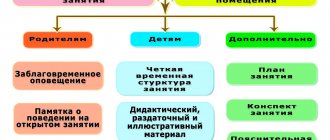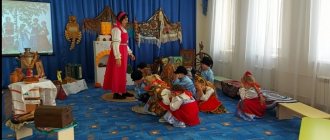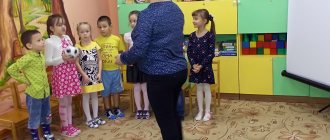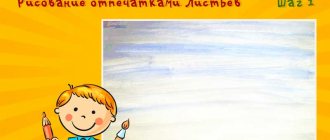Open integrated lesson in the senior group. Works by Marshak
Integrated lesson for children 5-6 years old. Topic: “Journey through the works of S.Ya. Marshak."
The author of the lesson is teacher Vesnina O.V.
Integration of educational areas: Social and communicative development, artistic and aesthetic development. Problem: Today, more than ever, preschool institutions are faced with the problem of developing a child’s interest in books. Modern children are moving away from books, preferring computers and televisions. Goal: To arouse children's interest in the works of S.Ya. Marshak. Objectives: - Summarize children’s knowledge about the writer and his works.
— Continue teaching children to memorize poems and improve their ability to solve riddles. - Develop children's artistic abilities. — Develop emotionally expressive speech. — Develop artistic and creative abilities in productive activities. Progress of the lesson:
Introductory part: (Children enter the beautifully decorated hall. The hall is decorated with children's drawings from the works of S.Ya. Marshak).
Hello guys! I see that you are all so beautiful, you are in a wonderful mood, because it’s so good that we are all gathered here today! Everyone is assembled - children are adults. We can begin. But first we need to say hello to everyone! (we say hello) Main part:
Educator:
Guys, look at our wonderful screen.
Who is shown in the portrait? Children's answer - (S.Ya. Marshak) Educator:
Correct!
This is the great children's writer S.Ya. Marshak. He lived for 77 years, you know his books, your mothers, fathers, and even grandparents knew him. And today I want to invite you on an exciting journey to the land of fairy tales and poems by Marshak. We will wake you up to remember and read the kind, cheerful works of this wonderful writer. And what we will take on this journey, you will have to guess. What kind of miracle? Blue house, Blue windows all around, Wears shoes with rubber And eats gasoline. (bus) (Children guess the riddle, we all get on the bus, the driver is chosen with Marshak’s counting, and everyone goes on a trip to the song “we eat, we eat, we eat”). Station "Vokzal" Educator:
Oh, guys, what's going on there?
What's that noise? (A lady in a hat and with a purse runs in) Robbers, thieves, freaks The dog is the wrong breed......give me back my little dog. Educator: Guys, do you know who this is? Children's answer: (Lady). Educator:
What work is this heroine from?
Children's answer...(Luggage) Educator: Let's remember the first lines of this poem. Children’s answer….(The lady checked in the luggage - a sofa, a suitcase, a travel bag…..etc.). (The Absent-Minded One enters). - “Deeply respected, respected carriage...etc.” Educator:
Look who it is?
And how strangely he is dressed. Children: Instead of a hat on the go, He put on a frying pan Instead of felt boots, gloves He pulled on his heels That's what an absent-minded one is from Basseina Street!!! Educator:
Guys, who is this?
Children: (Abstract). Educator:
We continue our journey.
"Station "Riddle". Educator:
Do you know that S.Ya.
Marshak came up with various riddles for children like you. Let's try to guess them (show slides with riddles). 1 riddle - (glasses).2- (saw). 3- (boots).4- (matches). Do you remember that matches are a very dangerous object? Children...answers. (The numbers 01 appear on the screen) Educator: What are these numbers? Children...answers. Educator:
Every citizen remember the firefighter number... Children - 01.
Educator:
Which work by Marshak are these lines from?
Children - "Fire". Educator:
Fire is our friend, but not always, it can cause trouble!
5-riddle - (calendar). (On the screen is a diagram of times and months of the year). Educator:
S. Ya Marshak has a poem “All Year Round,” remember?
We open the calendar... Children - January begins (name all the months of the year in order) Educator:
Guys, now everyone come to me.
Do you know that every season has its own fairy. And today one of the fairies came to us, but what time of year the fairy is visiting us, we will now guess. (The piece “Spring Fairy” is played; children listen and guess). Educator:
Guys, we need to continue our journey.
Station “Songs and Nursery Rhymes” Educator:
S.Ya.
Marshak lived and studied in England at the University of London and traveled a lot around the country. During these trips, he recorded many different songs and nursery rhymes, but they were all in English. And so that we could read them, Marshak translated them into Russian. Here, for example, is the long-known song “Humpty Dumpty.” Maybe someone wants to tell this song? (Children tell) Educator: - Another song “Little Fairies” (Children tell) Educator:
- And Gleb will help me show the nursery rhyme “Greedy” (we show).
Phys. just a minute. Guys, we all remember the work “Ball”, so we will not only tell you about it, but also show it. My cheerful ringing ball (jumping on two legs) Where did you run off to jump Red, blue, blue (jumping with alternating right and left legs) Can’t keep up with you I clapped you with my palm (claps your hands) You jumped and stomped loudly (we stomp our feet ). (A sparrow can be heard chirping.) Educator:
- Guys, what is that sound?
Children: - it’s a sparrow tweeting. Educator:
- Where did the sparrow have lunch?
Children: - At the zoo with the animals! Educator:
- Do you want to visit the zoo?
Children - Yes Teacher:
- Then let's go!
“Zoo Station” Educator:
Guys, let’s guess who the sparrow had lunch with?
(The voices of wild animals are heard, children listen and guess). Station "Theater" Educator:
- Do you want to go to the theater?
Children: - Yes Teacher:
- Come on in.
(A squeak is heard. Get the mouse toy) Educator: - How small you are, you must have gotten lost, where did you come from? Children: - This is a mouse from the work “The Tale of the Stupid Mouse.” Educator:
- Let's watch this fairy tale.
And our children will show it to us. (screening of the theatrical performance “The Tale of a Stupid Mouse”). Educator:
- Well, guys, our journey is coming to an end, and we need to return to our kindergarten.
(we get on the bus and return) Educator: - Here we are in kindergarten. (knock on the door) Educator:
- Who is knocking on my door with a thick bag on his belt?
Children: - It’s him, it’s him, the Leningrad postman! (The postman brings a book) Educator:
Look what a beautiful book, all the pages are multi-colored!
Children: - This is a Multi-colored book. Educator:
- Yes, exactly, this is a Multi-colored book.
Who is the author of this book? Children: - S.Ya. Marshak Teacher:
- Well done!
Oh, but look, there is not a single illustration in this book, what should I do? Or maybe we can paint it ourselves? (Children's answer). Practical part: (Children color the pages and present the drawings to the guests. Reading poems from the Multi-Colored Book) 1 page (green) This page is green, which means it is permanent summer….i.t. d. page 2 (yellow) Here is the yellow page, Desert Country...etc. d. 3 page (blue) This page is sea, You won’t see land on it...etc. d. 4 page (red) This page is red, Red sun, red summer...etc. d. 5 page (black) This page is at night, The capital is shrouded in darkness... etc. d. 6 page (white) This white page, Here a fox walked along it... etc. Educator :
What a wonderful, bright, colorful book we got, well done!
And now I have a little surprise for you. I want to show you the filmstrip “Baggage” in which you will hear the voice of S.Ya. Marshak. (View). FINAL PART. Educator: My dears, please tell me where we went today? Which writer's works do you remember? Name these works for me? How did the colorful book help? What did you like most? (children's answers). Educator:
Our journey has ended! Let's say goodbye to our guests! All together: GOODBYE.
We recommend watching:
Integrated lesson for children of the senior group Integrated lesson with a presentation for children of the senior group on the topic: Autumn Summary of an open lesson on familiarization with fiction in the senior group. Abstract of an integrated educational activity on cognitive development in a group of senior preschool age on t
Similar articles:
Summary of an integrated lesson in the senior group of kindergarten. Days of the week
Summary of a lesson in the senior group on the topic “Desert”
Abstract of GCD in mathematics in kindergarten in the senior group. Length, height, width of objects
Summary of an integrated lesson on the topic “Animals” in the senior group
Lesson summary - travel for children of the senior group of preschool educational institutions on the topic: Birds
MAGAZINE Preschooler.RF
Organizing timeWe will stand in a circle together, We need to say hello. I say to you: “Hello!” Smile back quickly. Hello right hand, Hello left hand, Hello friend, hello friend, Hello our entire friendly circle.
- Guys, today we are going to talk about heroes.
— Guys, what do you think of who can be called heroes?
— What do you think, in order to become a hero, what should one be?
—Can everyone be a hero?
— Is it heroism to cross the road in front of people in front of a speeding car?
- This is stupid heroism, you can die yourself, and the driver will suffer. A heroic act is when it is performed for something good, for example, if a person, risking his life, saves another.
“Now let’s sit down on the chairs and I’ll read you the work of Sergei Yakovlevich Marshak “The Story of an Unknown Hero.”
- Listen to the work and think whether the young man can be called a hero!
(reading the work)
“I suggest you guys relax a little and continue our conversation.”
Physical education (musical)
— You have just listened to the works of Sergei Yakovlevich Marshak “The Story of an Unknown Hero.”
— What genre can this work be classified into? Why do you think so?
- Why did the author call it “The Story”!
- Because Samuil Yakovlevich actually saw this incident, he was so shocked by this guy’s act that he decided to tell it to his readers, and did it in the way he knows very well - in verse.
— The event that the poet wrote about happened in our country. In the most important city, in our capital.
- What city is this? (accompanied by illustration)
— This incident actually happened in Moscow.
- Listen to the beginning of this poem again. (accompanied by illustration)
The firefighters are looking, the police are looking, the photographers are looking in our capital, they have been looking for a long time, but they can’t find some guy about twenty years old.
Of medium height, broad-shouldered and strong, he wears a white T-shirt and cap. The "GTO" sign is on his chest. They don't know anything about him anymore.
— Why do you think it is so difficult to find this young guy in Moscow?
- Right. According to the description, there were a lot of such young people not only in Moscow, but throughout the country. (reading of the work is accompanied by slides)
“Many guys are broad-shouldered and strong. Many wear T-shirts and caps. There are many similar icons in the capital. Everyone is ready for labor and defense.”
- Why were so many people looking for this particular guy? (accompanied by illustration)
“What did he do and what is he to blame for?”
“People in alarm looked under the roof: There, from the window, through the fiery smoke, the hands of a child were stretched out to them.”
— What did the young man do to save the child from the fire? (accompanied by illustration)
“Without wasting one minute, the guy rushed from the tram platform, across the car, and down the drainage pipe.”
-Let's play a game with you, I will read lines from a poem, and you name the personality quality:
“...he deftly got to the balcony...” So what is he like?
“...he climbed up the drainpipe. The third floor and the fourth and fifth, this last one is engulfed in fire, a shroud of black smoke hangs, fire is bursting out from the window. We still need to pull ourselves up a little, the guy, weakening, crawled to the window, stood up, choking in the smoke, on the ledge, took the girl and went down.”
“...without wasting a minute, the guy rushed from the tram platform, across the car, and climbed up the drainage pipe...”
“... people looking from below saw how carefully he walked along the cornice, now he had gone half the way, he still had to go half. One step, stop, another, stop...”
“...the guy jumped onto the platform of the tram, flashed like a shadow behind the glass of the carriage, waved his cap and disappeared around the corner...”
- Can this guy be called a hero?
— Many people saw how a guy saved a little girl from a fire, why is the poem called “The Story of an Unknown Hero?” (accompanied by illustration)
“The guy jumped onto the tram platform, flashed like a shadow behind the carriage glass, waved his cap and disappeared around the corner.”
- Why do you think the guy left so quickly? He would wait to be told “thank you” and praised.
- In what words can you say what he is like?
- Can saving a girl be called a feat?
— Guys, do you remember what profession people came to help when the fire happened?
- Let's remember how the firefighters behaved in this poem. (accompanied by illustration)
A moment - and the Copper helmets scattered. The stairs grew quickly, like in a fairy tale.
People in tarpaulins - One after another - Climbing up the stairs Into the flames and smoke...
The flame is replaced by carbon monoxide. The pump drives a water jet.
— What can you say about firefighters? What are they?
— There are also other professions that can be called heroic.
- Guys, I suggest you play. Let's divide into four teams and each team will collect a picture, and we will find out what these professions are.
Game "Collect the picture"
— What kind of professions did you get?
“It’s so good that there are people in the world who rush to help, do good deeds or perform heroic deeds.”
— In our country, people who perform feats and heroic deeds are highly respected and valued, and those who have especially distinguished themselves are awarded the “Hero of Russia” medal (accompanied by an illustration)
RESULT:
-What piece did you create today?
—Who wrote this work?
— What heroic act did the young man commit?
— Guys, what do you think, are there heroes in our city?
— I suggest that you and your parents find information about the heroes of Dzerzhinsk, and we will listen to your stories.




